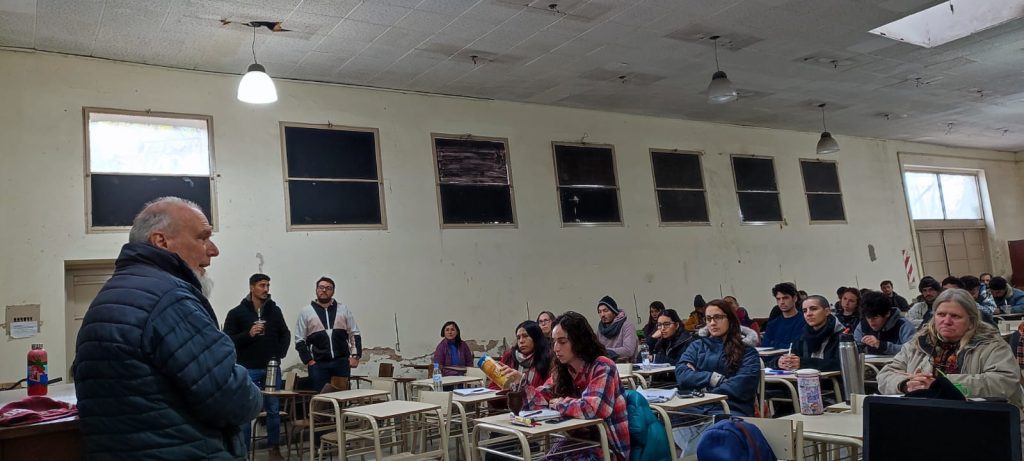
Last June 3rd, Enrico Cresta and Almendra Cremaschi participated as speakers in the workshop “Professionalizing Practice II: evaluation and diagnosis of socio-productive experiences” developed by the University Diploma on Agroecology at the National University of La Plata.
Almendra presented Transformation Labs (T-Labs) as a methodological framework for developing open and collaborative innovation experiences for sustainability. T-labs are safe spaces, meticulously designed and facilitated, where multiple actors meet to reframe wicked problems, such as those concerning access to seeds for agroecology.
Bioleft was created in a T-lab! In 2016, during an international research project called “Pathways to sustainability”, public policy officers, activists, private sector representatives -both from cooperatives and large seed companies- and researchers gathered to discuss problems of the seed system. During those years, Argentina’s congress was holding a debate about a possible change in the Seed Law. Since the current Seed Law was passed in 1973, some stakeholders, related to large seed companies, argued the need for a change which considered the particularities of new technologies such as transgenesis. Other actors, linked to family, peasant and indigenous farming argued that every change would tend towards greater appropriation of biocultural diversity and that the best thing was for the law to remain unchanged. The debate was long, but if you want to know more you can watch this video that we made at that time:
Through the implementation of participatory methodologies, actors, from their diversity, were able to address the problem from a new perspective and build a broader and (partly) shared vision of the seed issues in Argentina.
However, T-Labs are broader than only understanding a problem, it focuses on fostering transformation by developing new ideas combining social and technological elements. We called them “socio-technical innovations”. The very idea of a Laboratory refers precisely to the experimentation with novel technologies, artefacts or new ideas.
This takes a lot of time, dozens of workshops, hundreds of meetings and many participatory techniques. If you want to take a look at the ones we have been using and others that we have compiled, you can visit this participatory techniques repository.
As a result of Bioleft’s T-Lab, always intermediate, we have developed three tools/innovations:
- A legal tool consisting of a set of licenses for the transfer of seeds. These licenses have an innovative characteristic: implementing open-source ideas on seeds. You have probably heard of Linux. Linux is an operating system -like Windows but the opposite- based on its permanent availability to be improved and reused. This means you can do whatever you want with Linux provided you share the outcomes to guarantee access to the improvements, just as you had received access to the system. Bioleft developed an equivalent system for seeds. You can use them for yourself or improve them, if you make them available for others. It’s like hacking the patent system. We use intellectual property to share seeds, instead of restricting access to them. What’s better is that licenses are compatible with the legal system, whether the law changes or not, because they correspond to private law. What do you think?!
- The second tool is an open-source digital platform to make visible and connect seeds and users. We noticed in the T-Lab that those who practice organic or agroecological farming claim that there aren’t seeds adapted to their agricultural systems. But this is if we only look at commercial systems. When we observe local seed systems – seed houses, seed banks, exchange networks, fairs or guardians, we note that there are suitable seeds. What happens is that they are difficult to access. You need to know Yael to ask her for tomato seeds: https://www.bioleft.org/en/2024/06/28/tomate-criollo-intercambio-de-semillas-en-buenos-aires/. So, we created a seed repository where people load their seeds and, in that way, a decentralized seed bank is created.
- The third tool consists of two participatory breeding programs. Participatory breeding has many definitions and, even within Bioleft, we do not have a unique vision about what it is. But this doesn´t stop us from acting. One thing we like about T-Labs is that they are not focused on the search for a consensus but seek to generate operational agreements; in other words, while we discuss, we keep moving forward. However, we can say that participatory breeding is a system for developing new seeds based on the participation of farmers, breeders, extensionists, consumers, etc. Bioleft has two ongoing projects of participatory breeding. A project that seeks to recover the taste of tomatoes and another one in which we support the development of corn suitable for organic and agroecological agriculture.
Here is where Enrico showed off at the university meeting. Enrico is an organic farmer and leads corn experiments for this type of agriculture. In recent years he has had great achievements; for example, he developed GMO-free seeds, based on a collaborative project. Enrico tests the plants and selects those that are GMO-free, in a thorough process.
Enrico’s participation in this meeting opens an interesting door. It challenges the idea that knowledge belongs to the University and that farmers are those who listen to the experts. Transformation labs and participatory breeding are based on the premise that all actors have valid knowledge and that what fosters innovation is the articulation of these capacities, which allows fairer and more innovative systems.
We are thrilled to have participated in the course, and we are very grateful for the opportunity to show that other ways of doing and knowing are possible. If you want to join Bioleft, we are waiting for you with open arms. Email or send us a DM and let’s talk!